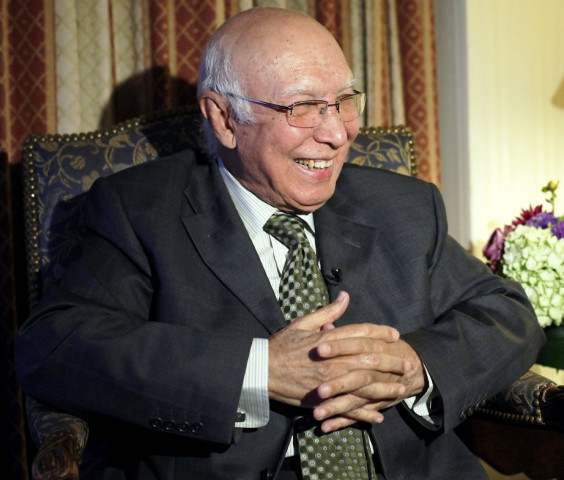Pakistan welcomes US-Cuba deal to restore ties
Sartaj Aziz says the step would help promote friendly relations between the two countries and their people

Adviser to the Prime Minister on National Security and Foreign Affairs Sartaj Aziz. PHOTO: REUTERS
Washington and Havana on Wednesday agreed a historic deal to re-establish full diplomatic relations, severed 54 years ago in the heat of the Cold War.
Presidents Barack Obama and Raul Castro exchanged letters agreeing to unfreeze ties on July 20, when embassies can be reopened.
Obama hailed the deal as a "historic step forward" that would end a failed and archaic US policy of isolating the Caribbean island, which like China is one of the world's few remaining Communist states.
President Obama on the re-establishment of diplomatic relations with #Cuba. pic.twitter.com/gQGrbCEITm
— Department of State (@StateDept) July 1, 2015
In a statement issued on Thursday, Adviser to the Prime Minister on National Security and Foreign Affairs Sartaj Aziz said the step to re-establish full diplomatic relations between the US and Cuba will help promote friendly relations between the two countries and their people.
Aziz said as a friend of both countries, Pakistan believed further steps towards full normalisation of relations will also promote the cause of peace and harmony in the region.
He wished both the governments success as they moved forward towards a new direction.
Meanwhile, welcoming the decision, Beijing's foreign ministry spokeswoman Hua Chunying said the decision was an "important step" that "serves the common interests of the two countries and two peoples, contributes to regional stability and development and also meets the long-term and universal aspiration of the international community".

PHOTO: CHINESE FOREIGN MINISTRY
"It is a good thing," she told reporters at a regular briefing. "We are pleased with that and we also welcome and support that."
She urged the US to remove its remaining embargoes and sanctions against Cuba.
Chinese President Xi Jinping visited the island last year, his final stop on a Latin American tour that also included Brazil, Argentina and Venezuela.
Read: Obama urges end to embargo as US, Cuba move to restore ties
Cuba, the only one-party communist state in the Americas, began opening up its economy in 2008 and is keen for more Chinese investment.
During Xi's visit, China and Cuba signed more than two dozen bilateral agreements ranging from a credit line to modernise a port to the development of golf courses.
They also signed agreements in finance, agriculture, industry, health, biotechnology, oil, energy, environment, education, telecommunications, use of cyberspace and digital television.
-With additional input from AFP



















COMMENTS
Comments are moderated and generally will be posted if they are on-topic and not abusive.
For more information, please see our Comments FAQ